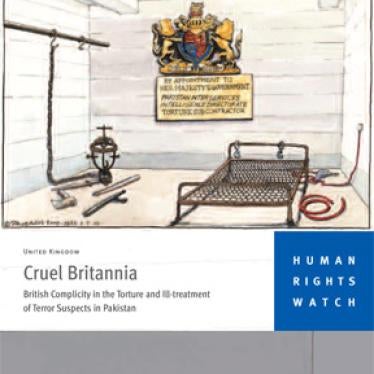Rt Hon Dr Kim Howells MP
Chair, Intelligence and Security Committee
Cabinet Office
London
Dear Dr Howells,
You stated in an interview on the Today Programme on 12th February that investigations conducted by the Intelligence and Security Committee (ISC) "do not seem to confirm" that UK intelligence agencies "are involved in any way in torture and complicity in torture".
I am writing to you to seek clarification regarding the investigations your committee has conducted into these matters.
As you are aware both the Foreign Affairs Committee (FAC) and the Joint Committee on Human Rights (JCHR) have conducted investigations into the issue of complicity by the UK government in torture. It is important to note that those investigations were not confined to the Binyam Mohamed case but looked at a much wider range of allegations.
Human Rights Watch gave evidence to both Committees in relation to research we have undertaken in Pakistan and the UK that has led us to the conclusion that there is compelling evidence of UK complicity in the torture of several British citizens at the hands of the Pakistani intelligence services. Both Committees agreed with our conclusion. The JCHR called, as we did, for a judicial inquiry. That call has growing support in Parliament.
Human Rights Watch subsequently published the full findings of its research last November in a report entitled "Cruel Britannia: British Complicity in the Torture and Ill-treatment of Terror Suspects in Pakistan."
In that report Human Rights Watch posed six outstanding questions with regard to UK counterterrorism policy, which remain unanswered and relevant today:
- What steps as a matter of policy does the UK government, including all intelligence and security agencies, take to ensure that torture and cruel, inhuman or degrading treatment or punishment are not used in any cases in which it has asked the Pakistani authorities for assistance or cooperation?
- What does the UK government do when it learns that torture or ill-treatment has occurred in a particular case?
- What conditions has the UK government put on continuing cooperation and assistance with Pakistan in counter-terror and law enforcement activities?
- Has the UK government ever conditioned continuing cooperation or assistance with Pakistan on an end to torture and other ill-treatment?
- Has the UK government ever withdrawn cooperation in a particular case or cases because of torture or ill-treatment?
- What is the policy and legal advice in force to ensure that UK officials and agents do not participate or acquiesce in, or are complicit in torture or ill-treatment?
We understand that the results of ISC investigations are not generally made public. A press release issued by your Committee in March 2009 indicated that the Committee had carried out an investigation into rendition in 2007 and had updated its assessment on the basis of new evidence, without indicating the Committee's findings or conclusions regarding allegations of complicity. In the light of your assurances on the Today Programme on 12th February, it would be helpful to know whether your investigations have shed any light on these questions and if so what the answers are.
Furthermore, in their joint letter to various newspapers on the 12th February, David Miliband and Alan Johnson say that, "[w}hen the ISC has completed its scrutiny of the guidance for agency officers, we will - for the first time ever - publish that guidance for the country to see." However, the letter fails to note that while the Prime Minister undertook to publish the guidance in March 2009, the government did not provide the guidance to the ISC until November 2009. Given it is now nearly a year since the government announced it would publish this advice, when will the ISC conclude this scrutiny? Furthermore, there is still no commitment on behalf of the government to publish the legal and policy advice that was in force at the time that these allegations of collusion in torture took place. Will the ISC press the government to publish this guidance, which is central to determining what government policy was at the time of alleged abuses?
So far the government has reacted to allegations of UK complicity in torture in Pakistan with blanket denials, but without addressing any of the specific allegations or any of the serious questions that these allegations raise. The government has reacted in the same manner to the revelations that have emerged in the courts over UK involvement in the mistreatment of Binyam Mohamed.
I would also like to note that neither we nor, as far as we are aware, the Guardian newspaper (which has conducted its own extensive investigations into these matters), nor lawyers acting for any of the men whose rights have been violated, have been called to give evidence by the ISC. We do not understand how the ISC or the government can come to any conclusions about the possible complicity in torture of British security and intelligence services without speaking to those most familiar with the evidence.
If the ISC really wants to get to the bottom of these cases, Human Rights Watch would be more than willing to provide information to the ISC in any future investigations into these matters.
Yours sincerely,
Tom Porteous
London Director
Cc: Rt Hon Gordon Brown MP, Prime Minister
Cc: Rt Hon David Miliband MP, Secretary of State for Foreign and Commonwealth Affairs
Cc: Andrew Dismore MP, Chair, Joint Committee on Human Rights
Cc: Sir John Sawers, Chief, British Secret Intelligence Service (SIS)
Cc: Jonathan Evans, Director General, Security Service







